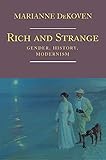Rich and Strange : Gender, History, Modernism / Marianne DeKoven.
Material type: TextPublisher: Princeton, NJ : Princeton University Press, [2022]Copyright date: ©1992Description: 1 online resource (257 p.)Content type:
TextPublisher: Princeton, NJ : Princeton University Press, [2022]Copyright date: ©1992Description: 1 online resource (257 p.)Content type: - 9781400820580
- American fiction -- History and criticism
- Authorship -- Sex differences
- English fiction -- 20th century -- History and criticism
- Modernism (Literature) -- English-speaking countries
- Sex role in literature
- LITERARY CRITICISM / Women Authors
- Adjective
- Allusion
- Ambiguity
- Ambivalence
- Anti-Oedipus
- Awakenings
- Black people
- Bourgeoisie
- Carelessness
- Castration
- Classicism
- Conflation
- Counterstereotype
- Cowardice
- Cynicism (contemporary)
- Cynicism (philosophy)
- Deconstruction
- Deleuze and Guattari
- Denial (poem)
- Desiring-production
- Dialectic
- Digression
- Disgust
- Duress
- Embarrassment
- Emblem
- Eroticism
- Fatalism
- Femininity
- Feminism (international relations)
- Feminism
- Genre
- Gertrude Stein
- Gloom
- Greatness
- Hatred
- Ideology
- Imagery
- Imperialism
- Indication (medicine)
- Infanticide
- Irony
- Jacques Derrida
- John Barth
- Joseph Conrad
- Kurtz (Heart of Darkness)
- Laziness
- Leveling (philosophy)
- Liminality
- Literature
- Loneliness
- Lord Jim
- Luce Irigaray
- Macabre
- Masculinity
- Meanness
- Memoir
- Metonymy
- Misogyny
- Modernism
- Mr
- Mrs
- Narrative
- New Criticism
- Novel
- Novelist
- Oppression
- Patusan
- Pity
- Plotinus
- Poetry
- Postmodernism
- Promiscuity
- Race (human categorization)
- Racism
- Result
- Reterritorialization
- Self-destructive behavior
- Selfishness
- Sexual inhibition
- Simile
- Sister Carrie
- Stanza
- Stupidity
- Subjectivity
- Suggestion
- Superiority (short story)
- Sympathy
- T. S. Eliot
- Tender Buttons (book)
- Terence
- The Other Hand
- The Voyage Out
- Think of the children
- Thought
- Undoing (psychology)
- Upper middle class
- Western culture
- Woolf
- Writing
- 823/.91091
- PR888.M63
- online - DeGruyter
| Item type | Current library | Call number | URL | Status | Notes | Barcode | |
|---|---|---|---|---|---|---|---|
 eBook
eBook
|
Biblioteca "Angelicum" Pont. Univ. S.Tommaso d'Aquino Nuvola online | online - DeGruyter (Browse shelf(Opens below)) | Online access | Not for loan (Accesso limitato) | Accesso per gli utenti autorizzati / Access for authorized users | (dgr)9781400820580 |
Frontmatter -- CONTENTS -- ACKNOWLEDGMENTS -- INTRODUCTION -- PART I: TOWARD THE MODERNIST NARRATIVE -- PART II: CONRAD AND OTHERS -- PART III: IN THE WAKE OF EARLY MODERNIST NARRATIVE -- NOTES -- INDEX
restricted access online access with authorization star
http://purl.org/coar/access_right/c_16ec
Like the products of the "sea-change" described in Ariel's song in The Tempest, modernist writing is "rich and strange." Its greatness lies in its density and its dislocations, which have until now been viewed as a repudiation of and an alternative to the cultural implications of turn-of-the-century political radicalism. Marianne DeKoven argues powerfully to the contrary, maintaining that modernist form evolved precisely as a means of representing the terrifying appeal of movements such as socialism and feminism. Organized around pairs and groups of female-and male-signed texts, the book reveals the gender-inflected ambivalence of modernist writers. Male modernists, desiring utter change, nevertheless feared the loss of hegemony it might entail, while female modernists feared punishment for desiring such change. With water imagery as a focus throughout, DeKoven provides extensive new readings of canonical modernist texts and of works in the feminist and African-American canons not previously considered modernist. Building on insights of Luce Irigaray, Klaus Theweleit, and Jacques Derrida, she finds in modernism a paradigm of unresolved contradiction that enacts in the realm of form an alternative to patriarchal gender relations.
Mode of access: Internet via World Wide Web.
In English.
Description based on online resource; title from PDF title page (publisher's Web site, viewed 29. Jul 2022)


